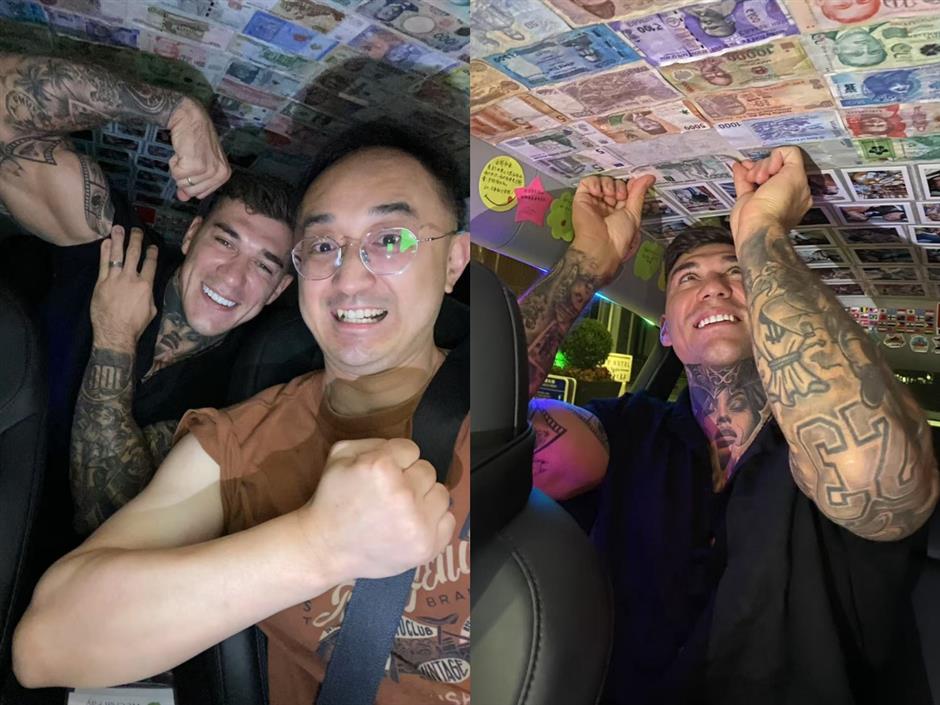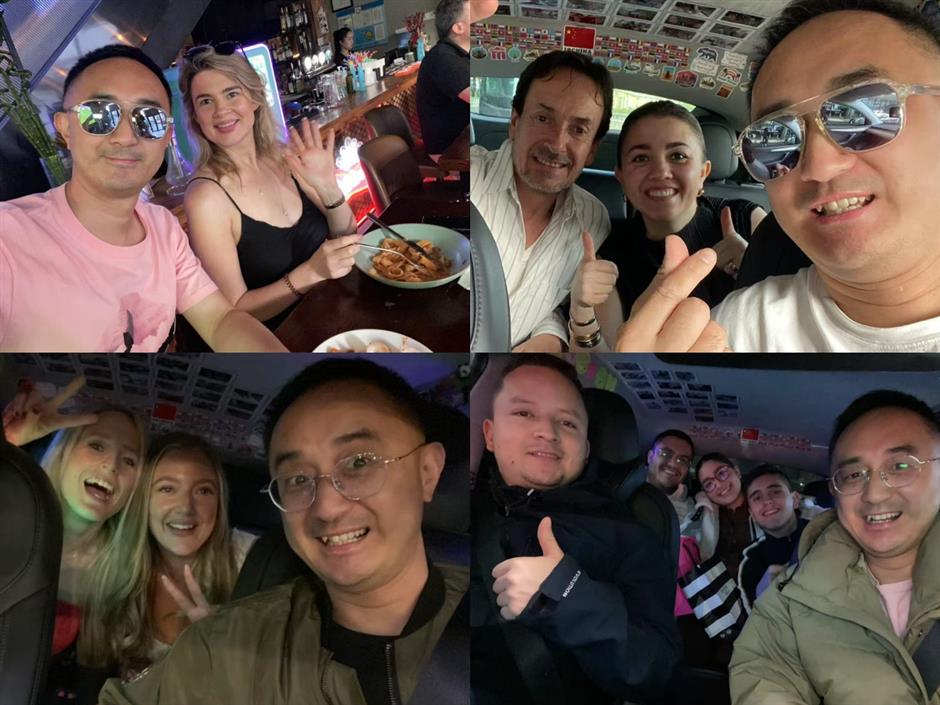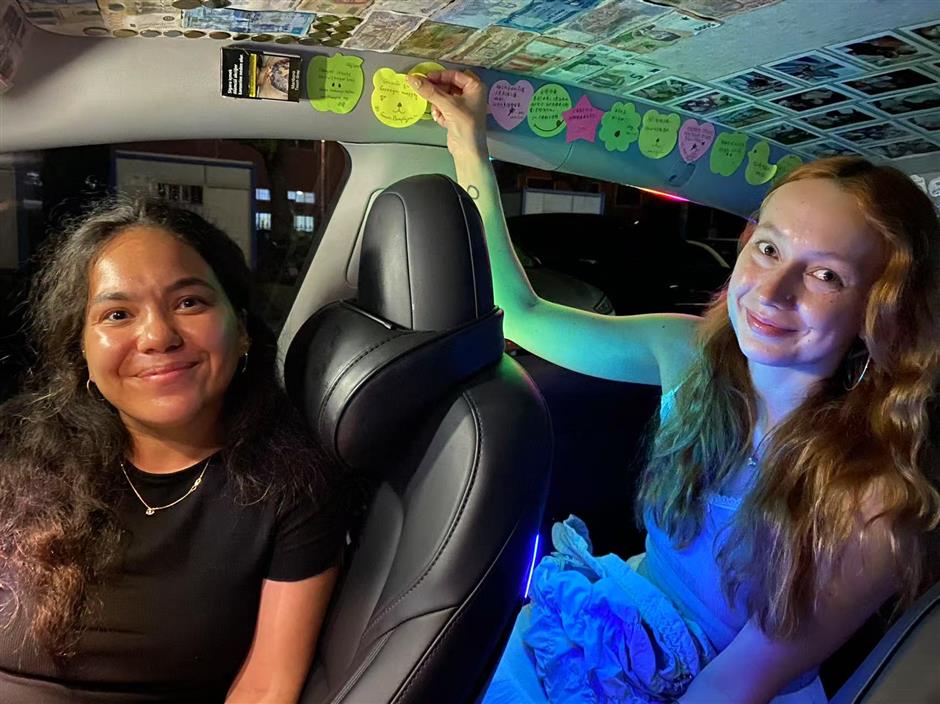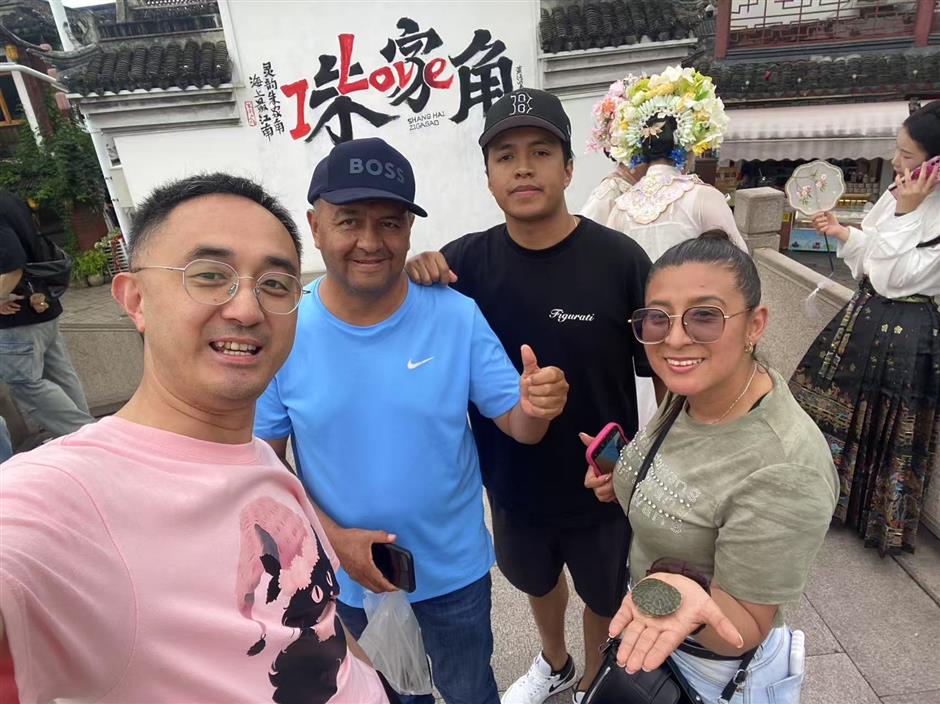
Shot by Yu Wenhao. Edited by Li Tianle. Reported by Zhu Qing, Yang Meiping. Subtitles by Li Tianle.
In Shanghai, most ride-hailing trips take place in silence. The driver focuses on the road while the passenger scrolls through their phones, exchanging only a destination at the beginning and a brief "we're here" at the end.
Step into Wang Zoufan's car, and the experience is different from the outset. Within seconds, music fills the cabin – sometimes Utada Hikaru's "First Love," other times a tune you've never heard about but instantly enjoy.
Wang, better known as "Seven" on social media handles, has a talent for encouraging strangers to talk, sometimes even to sing along. For a few kilometers, the car feels less like a ride-hailing vehicle and more like a moving living room.
"If there's one song that sums up my journey," Seven says, "it's 'Nothing's Gonna Change My Love for You.' Whatever happens, I try to stay passionate and offer my best."

Seven poses with a boxer from Siberia, who, like many of his passengers, left a banknote from his country on the car's ceiling.
A few years ago, Seven wore suits to work as a mid-level manager at a multinational company. An unexpected layoff forced him to rethink his future.
"People said driving was beneath me," says Seven. "But shedding that corporate uniform wasn't hard. What mattered was finding something that made me feel alive."
He had been preparing for this transformation unconsciously all along. For nearly two decades, his family rented out a spare room to international tenants.
"I learned my English the hard way," he says with a laugh. "When someone gets into your car, if you miss those first few sentences, the whole ride might be silent."
Driving itself wasn't new either. Even during his corporate years, he often logged on after work.
"I just liked talking to different people," he says. "Back when Uber was still in China, I was already behind the wheel. I guess I'm the first generation."
Those experiences – language skills, cross-cultural ease, a love of conversation – appeared unrelated at first. They have now merged to form a livelihood. "No skill ever goes to waste," he declares.

Seven with passengers from around the world
At first, most of his riders were local commuters. But conversations with foreign travelers revealed something more. Some even booked him again the next day. "That's when I thought, maybe I can really focus on this niche," he recalls.
He began posting clips from his rides on Facebook, then branched out to other platforms. Word of mouth quickly spread, leading to the arrival of new riders through friends' referrals.
Over time, he realized his ideal clients weren't local office workers at all, but international visitors – tourists and business travelers.
Policy shifts gave him a further boost. Since December 2023, China has gradually implemented a trial unilateral visa-free policy for more than 40 countries, and in December 2024, Shanghai extended its visa-free transit duration to 240 hours (10 days), resulting in a surge in inbound tourism. Seven says his orders increased by 60 percent. "Most of my clients are from Southeast Asia and Russia, followed by the Middle East, then Europe and the US," he notes.
Early 2025 brought another shift. As the TikTok refugee wave drove foreigners toward Chinese platforms like Xiaohongshu (RedNote), Seven followed. He reposted his clips on RedNote, Douyin and WeChat Channels. To his surprise, some went viral. One video of him singing "First Love" with Japanese passengers has garnered nearly 3.4 million views.
"I never expected that kind of response," he admits. "These platforms don't bring me many customers directly, but they let me reach the right audience. And if someday it leads to sponsorships or ads, why not?"
For Seven, rides are never just transactions. They turn into stories.
He recalls three Russian businessmen who, not long into the ride, realized one of them had left a bag containing more than US$100,000 in cash in a mall restroom. Seven calmed the stunned passengers, called the police, and drove them back to the mall. After a tense search, the wallet turned up at a police station, untouched.
"Their hands shook as they signed the paperwork," he remembers. "Back in the car, they pressed US$100 into my hand. To me, it said something simple: In China, even a bag stuffed with cash can make its way home."
Not every story is so dramatic. Many passengers leave something smaller: banknotes from their home countries. Today, the ceiling of Seven's car is covered with bills from more than 100 nations, a patchwork of currencies that forms a miniature museum.
"It's not about the money," he explains. "The first was a 5-pound note. Once I put it up, others followed. Some look like a fortune but are exchanged for just a few yuan – it's the thought that matters. I even leave a gap to allow new passengers to add their stories."

Passengers leave both banknotes and handwritten notes in Seven's car.
Unlike many drivers who grind through 15-hour days, Seven limits himself to eight. The rest of his time goes into designing trips and staying connected with clients. "I need every ride to be full of passion," he says.
"I see myself as a driver, a guide and a friend, all in one," he adds. Instead of selling fixed tour packages, he tailors each trip to the rider. That approach has since grown into a business: He now runs a fleet of nearly 30 bilingual drivers under a small travel company.
His rule for new recruits is simple: "Two words – passion and confidence. Skills can be learned, but without passion, you can't serve well."
The same philosophy extends to customers. He keeps in touch with them on social media, likes posts, and sometimes even adds family members. "Keeping those ties alive matters," he says. "So when they return to China, I'm the first person they think of."
At home, perceptions have shifted, too.
"At first, my wife was embarrassed to tell relatives what I did," Seven admits. "The contrast was too big – one day a Fortune 500 manager, the next day a driver."
But as his videos went viral and praise poured in, her attitude softened. Now she shares his clips and encourages friends to like them. "It may seem small, but to me it's real support," he says.

Seven takes a Colombian family on a tour of Zhujiajiao watertown in suburban Qingpu District.
Some wonder whether major platforms offering a "bilingual driver" option might threaten his business. Seven shakes his head.
"Most platform drivers just go from A to B, with a script. I create experiences around each passenger's interests. Passion and curiosity can't be standardized."
He knows he's only at the beginning. "I've maybe done 30 percent of what I want," he says.
His goal is to build a nationwide brand of bilingual drivers and even launch niche tours – for example, for retirees seeking cultural or wildlife experiences. "In many countries, older people spend money on cultural trips and nature experiences. China could develop that market too," he notes.
In his car, you might hear a song, a story, or a cross-cultural exchange. For passengers, it's a memory. For him, it's reinvention.
"The only constant is change," Seven says. "Life is uncertain, but I've learned to dance with it."

